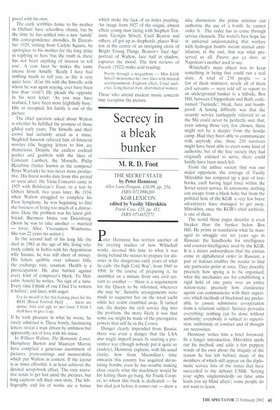Secrecy in a bleak bunker
M. R. D. Foot
THE SECRET STATE by Peter Hennessy Allen Lane/Penguin, £16.99, pp. 234, ISBN 0713996269 KGB LEXICON edited by Vasiliy Mitrokhin Frank Cass, £35. pp. 451, ISBN 0714652571 Peter Hennessy has written another of his riveting studies of how Whitehall works, devoted this time to what it was doing behind the scenes to prepare for disaster in the dangerous early years of what he calls the high Cold War', from 1945 to 1968. In the course of preparing it, he stumbled on a minute from one civil servant to another — 'there is a requirement for the Queen to be informed, wherever she may be'. Suitable arrangements were made to sequester her on the royal yacht while her realm crumbled away. It turned out, the deeper the civil service dug into the problem, the more likely it was that some use might be made of the prerogative powers that still lie in the Crown.
Danger clearly impended from Russia: there was even a danger that the USA also might imperil peace by starting a preventive war (though nobody put it quite so crudely). Hennessy explains, with his usual clarity, how from Macmillan's time onwards this country has acquired devastating bombs; even he has trouble making clear exactly what the machinery would be for letting them go bang. Sir Frank Cooper, to whom this book is dedicated — he has died just before it comes out — drew a
nice distinction: the prime minister can authorise the use of a bomb, he cannot order it. The order has to come through service channels. The world's best hope lay in universal understanding that warfare with hydrogen bombs meant mutual annihilation; in the end, that was what preserved us all. Pourvu que ca dure, as Napoleon's mother used to say.
Whitehall's main object was to keep something in being that could run a real state. A total of 210 people — a few of them ministers, nearly all of them civil servants — were told off to report to an underground bunker in a hillside, Box Hill, between Chippenham and Bath, codenamed 'Turnstile': bleak, bare and bombproof. A lasting difficulty was that the security service (unhappily referred to as the SS) could never be perfectly sure that, even among those very few chosen, there might not be a sleeper from the hostile camp. Had they been able to communicate with anybody else, those 210 survivors might have been able to exert some kind of authority; but of the free society they had originally enlisted to serve, there could hardly have been much left.
From the unfree society that was our major opponent, the courage of Vasiliy Mitrokhin has conjured up a pair of textbooks, each having legal force within the Soviet secret service. In astronomy, nothing can escape from a black hole; but from the political hole of the KGB a very few brave adventurers have managed to get away. Mitrokhin, once the KGB's chief archivist, is one of them.
The world these pages describe is even bleaker than the bunker below Box Hill. He prints in translation what he managed to smuggle out ten years ago in Russian: the handbooks for intelligence and counter-intelligence used by the KGB. It is a minor awkwardness that the entries come in alphabetical order in Russian; a pair of indexes enables the reader to find any particular point at once. They describe precisely how spying is to be organised; what the mechanics are for establishing a rigid hold of one party over an entire nation-state; precisely how clandestine agents can communicate with their superiors; which methods of blackmail are preferable to ensure submissive co-operation from a reluctant subject. Secrecy pervades everything; nothing can be done without authority; everybody is subject to supervision; uniformity of conduct and of thought are necessities.
Hennessy writes him a brief foreword. In a longer introduction, Mitrokhin spells out his method, and adds a few peppery words of his own about the iniquity of the system he has left behind, many of the members of which still appear on the diplomatic service lists of the states that have succeeded to the defunct USSR. 'Setting your sights singlemindedl■,, on false aims leads you up blind alleys"; some people do not want to learn.






































































 Previous page
Previous page